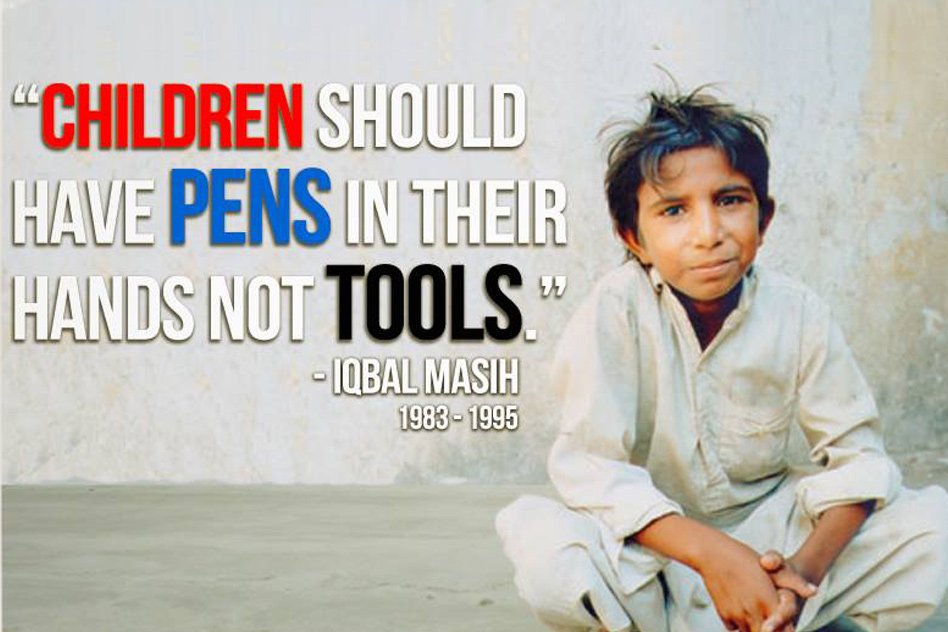
22 Years Ago, He Was Murdered For Fighting Against Child Labour; Know About Him
17 April 2017 4:43 AM GMT
There are little heroes whose stories will continue to inspire till the world comes to an end. The strong struggle against child labour and bonded labour can’t be mentioned without taking the name of Iqbal Masih.
Iqbal was born into a poor family in Muridke near Lahore. His financially burdened father, Saif Masih decided to leave the little boy at a tender age. Inayat, his mother had borrowed a loan of 600 rupees from Arshad, a local business person who owned carpet weaving factory. Arshad wanted the boy to work as a bonded labour till the debt was paid off.
The exploitation of Iqbal and several other children began the day he joined the carpet weaving factory. He was made to work 14 hours a day with a 30-minute break. Despite working for 7 days a week and paying 3 cents for the loan, the loan got bigger. The more horrific tale was yet to begin.
At the time, he joined the factory he was only 10. When he came to know the abolition of bonded labour by the Supreme Court of Pakistan, he along with his friends made an escape to the local police station where they narrated their ordeal. Police, on the contrary, took Iqbal back to Arshad who tied him upside down. At the direction of the police officer, Iqbal was chained to the carpet machine and Arshad forced him back to work with a combination of physical abuse and starvation. Complete abolition of bonded labour was not implemented because of the nexus between the criminals and the corrupt police officials of Pakistan.
Courage and will to overcome all difficulties encouraged Iqbal, who once again escaped from the factory. He joined Bonded Labour Liberation Front (BLLF) of Pakistan to help stop child labour around the world. By this time, he became a prominent face of the anti-slave movement. At 12, Iqbal found a way to attend a freedom day celebration held by the Brick Layer Unions. There he heard about his rights as a labourer and that debt slavery was outlawed a few years ago. In addition to the law against slavery, the government had cancelled all debts with businesses so they could, in turn, free those indebted to them. However, very few businesses actually released their slaves. Iqbal volunteered to narrate his horrific tale which made one of the union leaders named Ehsan Ullah Khan to organise an effort to free Iqbal from bondage. After much convincing about the illegality of his factory, Arshad freed Iqbal and some of the other child slaves. During this period, he finished 4 years of schooling in just 2 years and helped nearly 3000 Pakistan children who were trapped in slavery. He made speeches in the factories and asked the children to speak their minds. His malnourished body and stunted growth were never perceived as a threat by those whose very establishment Iqbal dared to challenge.
Iqbal was killed in Muridke on April 16, 1995, shortly after returning from a trip to America. He was only 12. His funeral was attended by as many as 800 mourners. “The Little Hero” is a book that throws light on his legacy.
He was the biggest source of inspiration behind the formation of several organisations such as ‘The Free Children’, a Canada-based charity and the Iqbal Masih Shaheed Children Foundation which has started over 20 schools in Pakistan. In January 2009, the United States Congress established the annual Iqbal Masih Award in honour of Iqbal Masih for the elimination of child labour.
Even Nobel Prize winner Kailash Satyarthi who won the Nobel Prize on grounds of prevention of child labour mentioned the name of Iqbal in his valedictory speech.
 All section
All section













